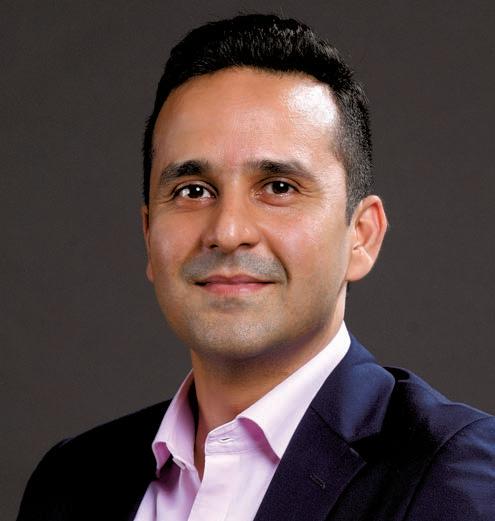
3 minute read
The future of diagnostic labs: Enhancing efficiencyand accuracyfor better patient care
Karan Bhatia,Head-Marketing,Beckman Coulter Diagnostics (South West Asia),highlights how advancements in the diagnostics industry will revolutionise healthcare by empowering labs of the future to deliver exceptional results.These advancements will improve lab efficiency,diagnostic accuracy,and ultimately benefit patients through improved patient outcomes
Navigating the intricate world of healthcare diagnostic labs is no easy feat. These labs juggle multiple goals, which include ensuring excellent test quality for reliable results, reducing turnaround time and maximizing the variety of tests they can provide to patients. In addition to these objectives, most labs need to be both, efficient in their operations and commercially viable.
As healthcare delivery systems rapidly evolve, diagnostic labs will be at the heart of change, meeting new challenges and striving to meet the growing needs and expectations of patients and clinicians.
Imagine labs that provide doctors innovative diagnostics to give precise insights into patient health well before clinical symptoms are felt. Or labs where all routine tasks are automated, enabling lab professionals to dedicate their time to intricate analysis and interpretation that will make a real difference in patient care.
As we stand at the cusp of the future, and contemplate the evolution of the diagnostic lab, one thing remains certain – the patient is at the heart of it all. The efficiency and accuracy with which we serve them will be a benchmark of our success. So, what could these labs of the future look like? Here’s a glimpse.
◆ Newer and more personalised tests: The labs of tomorrow will offer tests that will make doctors’ jobs easier by giving them early indicators of what their patients’ health conditions are, regardless of clinical symptoms. Examples of this are the adoption of tests like Monocyte Distribution Width (MDW), a
Futuristic labs will automate routine tasks,allowing professionals to focus on complex analysis,interpretation, and decision-making.Cutting edge technologies and intelligent algorithms will enable more accurate diagnostics,leading to improved patient care and outcomes hematology marker that helps in the early detection of sepsis; or the Prostate Health Index (PHI), a test that helps to reliably determine whether a biopsy is needed for the detection of prostate cancer, thereby preventing unneces- sary biopsies. In the not-so-distant future, we will see personalised testing becoming the norm with genetic tests and gene sequencing becoming commonly available. Advanced screening techniques and real- time disease progression monitoring by labs will enable early intervention, potentially preventing the development of severe conditions and improving overall health outcomes.
◆ Clinical decision support through AI and machine learning: The analysis of diagnostic test results will be aided by software and technology that will give the lab professional clear pointers and speed up the diagnosis of patients. This will empower lab staff to concentrate on the cases that need their specialised expertise. As AI applications in diagnostics continue to expand through big data analysis, predictive algorithms and image analysis, labs will also need to address evolving regulatory requirements and prioritise data privacy measures.
◆ Freedom from the laborious: Labs of the future will automate routine tasks. Cutting edge technologies and intelligent algorithms will enable more accurate diagnostics, leading to improved patient care and outcomes. Lab instruments will be designed in a way that they will need almost no maintenance. This will free up time of lab professionals to enable them to concentrate on important issues related to clinical significance and interpretation of tests, rather than focus on relatively more routine tasks.
◆ Pre-analytical workflows will be automated: This is something that even the most sophisticated labs of today grapple with and in the years to come, this will be one of biggest pain points that labs will solve. For labs handling thousands of samples a day, it is a serious challenge to maintain sample integrity and track and trace their samples from the time they are collected from patients to the time they are accepted and processed in the lab.
This is a critical operations management issue as more than 70 per cent of all errors in the diagnostic lab occur in the pre-analytical phase. Addressing this one issue alone will streamline labs, enabling them to prevent mix ups and errors and empowering them to provide more accurate results, faster. Over the coming decade, most high-workload labs will automate their sample processing using robotics and sample management software to run their operations.
◆ Harnessing clinical IT solutions: Regardless of their scale, labs of the future will harness the potential of clinical IT or middleware software to manage their operations. While these solutions will require upfront investments, their implementation will lead to step changes in the efficiency of lab operations. These software solutions will enable lab managers to run their labs with real-time quality checks, automated verification and validation of results, realtime error detection and systems for data referencing and archival to ensure patient health trends are easily visible.
The combination of cuttingedge technologies, automation, data management tools, and skilled professionals will drive exceptional results in terms of efficiency, accuracy, and overall enhancement of laboratory processes. The future holds immense promise for further advancements in diagnostic practices, which will ultimately benefit patients and transform healthcare.










